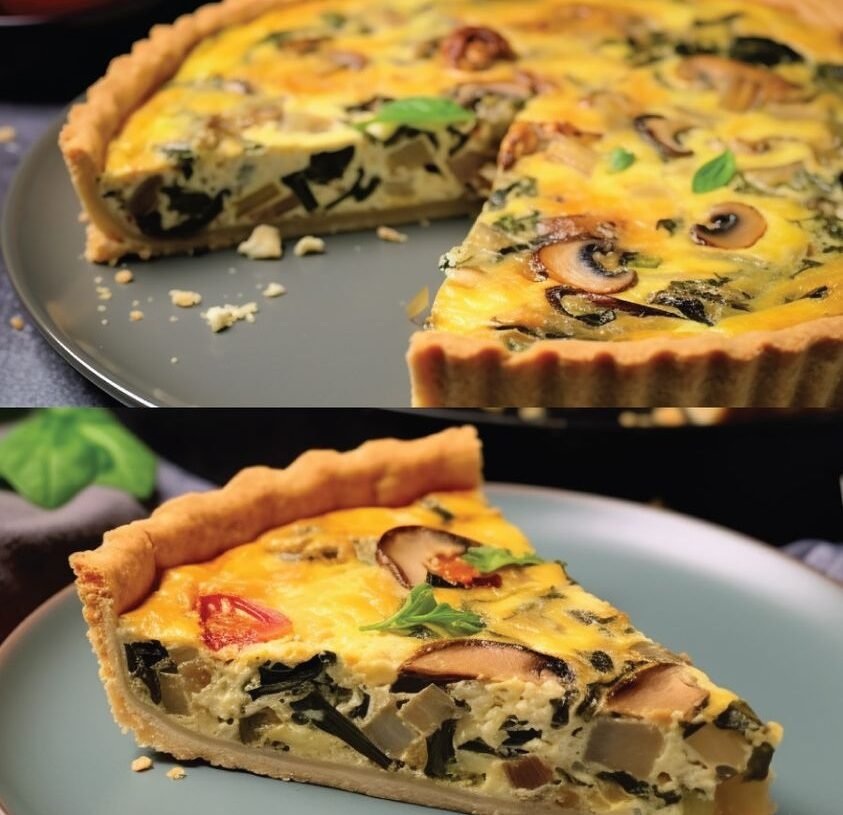Indulge in the savory and comforting flavors of a Quiche Vegan Recipe that’s both satisfying and compassionate. This plant-based version of the classic quiche offers a delicate balance of textures and tastes, making it a perfect dish for breakfast, brunch, or a light dinner. Packed with wholesome ingredients and free from animal products, this Vegan Quiche is a delicious way to enjoy the richness of quiche while honoring your dietary choices.
Vegan Quiche Recipe: Servings: 6-8
Ingredients: For the Crust:
- 1 1/2 cups all-purpose flour
- 1/2 teaspoon salt
- 1/2 cup vegan butter or coconut oil, chilled and cubed
- 4-6 tablespoons ice water
For the Filling:
- 1 cup firm tofu, drained and crumbled
- 1 cup unsweetened plant-based milk (such as almond, soy, or oat milk)
- 2 tablespoons nutritional yeast
- 2 tablespoons olive oil
- 1 small onion, finely chopped
- 2 cloves garlic, minced
- 1 red bell pepper, diced
- 1 cup chopped spinach or other greens
- Salt and pepper to taste
- Optional: Vegan cheese shreds for topping
Instructions: For the Crust:
- In a food processor, combine the flour and salt. Add the chilled vegan butter or coconut oil and pulse until the mixture resembles coarse crumbs.
- Gradually add ice water, one tablespoon at a time, and pulse until the dough begins to come together.
- Turn the dough out onto a floured surface and gently knead it into a ball. Wrap it in plastic wrap and refrigerate for at least 30 minutes.
For the Filling:
- Preheat your oven to 375°F (190°C).
- In a blender, combine the crumbled tofu, plant-based milk, nutritional yeast, and olive oil. Blend until smooth and creamy. Set aside.
- In a skillet, heat a bit of olive oil over medium heat. Sauté the chopped onion, garlic, and red bell pepper until softened.
- Add the chopped spinach or greens to the skillet and cook until wilted. Season with salt and pepper.
- Combine the sautéed vegetables with the blended tofu mixture and stir to combine.
Assembling and Baking:
- Roll out the chilled dough on a floured surface to fit your pie dish. Transfer the rolled dough to the dish, pressing it gently into the bottom and sides.
- Pour the tofu and vegetable mixture into the prepared crust.
- If desired, sprinkle vegan cheese shreds on top.
- Place the quiche in the preheated oven and bake for about 35-40 minutes, or until the filling is set and the crust is golden brown.
- Allow the quiche to cool slightly before slicing and serving.
Nutrition Facts (per serving, based on 8 servings):
- Calories: ~250
- Total Fat: 15g
- Saturated Fat: 3g
- Total Carbohydrates: 19g
- Dietary Fiber: 2g
- Sugars: 2g
- Protein: 10g
Gut Health:
Plant-based diets are often associated with improved gut health due to the high fiber content from fruits, vegetables, and whole grains. A healthy gut microbiome is linked to better digestion and overall well-being.
Anti-Inflammatory Properties:
Many plant-based foods have anti-inflammatory properties, which can help in reducing inflammation in the body. Chronic inflammation is associated with various health issues, and a vegan diet may contribute to its prevention.
Sports Performance:
Contrary to the misconception that vegan diets lack protein, many successful athletes follow plant-based diets to enhance their performance. Plant-based proteins can support muscle building and recovery.
Reduced Risk of Foodborne Illnesses:
Plant-based diets eliminate the risk of foodborne illnesses associated with the consumption of undercooked or contaminated animal products.
Economic Impact:
A vegan diet can be more economical as plant-based protein sources tend to be cost-effective compared to some animal products. It may be a budget-friendly option for individuals or families.
Mindful Eating:
Adopting a vegan lifestyle often promotes mindful eating. Being more conscious of food choices and sources can lead to a healthier relationship with food and a greater appreciation for the environmental impact of dietary decisions.
Preservation of Biodiversity:
The expansion of animal agriculture often leads to habitat destruction and loss of biodiversity. Choosing a vegan diet supports the preservation of ecosystems and the protection of various species.
Culinary Diversity:
Veganism introduces individuals to a diverse range of cuisines and ingredients from around the world. Exploring plant-based cooking can be a culinary adventure, embracing flavors and techniques from different cultures.
Reduced Antibiotic Resistance:
The use of antibiotics in animal farming contributes to the rise of antibiotic-resistant bacteria. Opting for a vegan diet can be a way to reduce the demand for such practices and promote responsible antibiotic use.
Cruelty-Free Beauty and Personal Care:
Veganism extends to beauty and personal care products. Choosing cruelty-free, vegan alternatives ensures that your lifestyle aligns with ethical choices beyond just dietary preferences.
